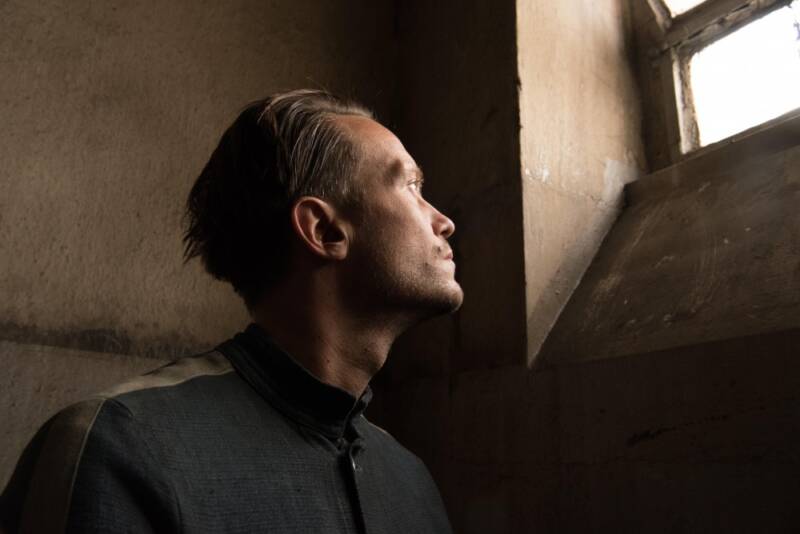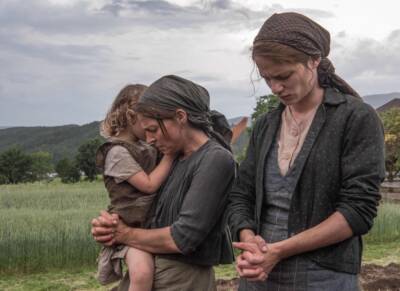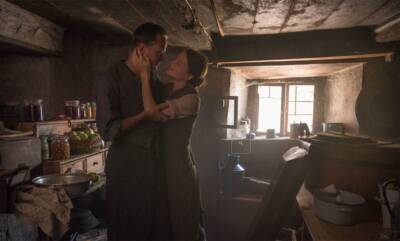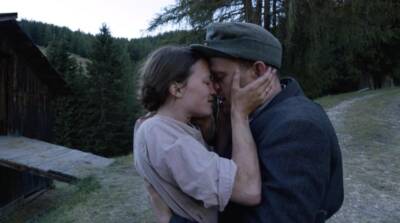
A Hidden Life — a film review by Gary Chew
Terrence Malick is a poet of cinema. His latest film is not meant to be a work of wit, therefore, A Hidden Life is not brief. And I don’t mean to suggest not seeing the movie by also saying … it must be endured.
Watching A Hidden Life requires you observe what Franz J ä ggerst ä tter endures … as taken from his own words in writings that are titled “Radegund.” I imagine Malick has committed a sin of self-indulgence with his sense of duty to “report” here in the early 2lst century what visual beauty can be conversely grown out of a period of hate and ugliness that occurred a little more than a half century ago … but which forever lurks.
 Franz (August Diehl) is a simple, honest Austrian man. We see him meet and fall in love with Frani (Valerie Pachner). They marry, have children and farm the sloping foothills near the mountain village where they make their home. The time is early in the late 30s and early 40s. The rise of the Third Reich is at hand.
Franz (August Diehl) is a simple, honest Austrian man. We see him meet and fall in love with Frani (Valerie Pachner). They marry, have children and farm the sloping foothills near the mountain village where they make their home. The time is early in the late 30s and early 40s. The rise of the Third Reich is at hand.
Franz also works as a sort of custodian at the village church. He’s devout, but doesn’t seem to be an unreasonable man. He loves his life, his wife and his little daughters. His intentions are pure. When confronted with pledging allegiance to Hitler and the inhumanity the name represents, Franz endures with a simple but resounding and continuing “nay.” Franz believes his God has given him free will to make life’s choices. He chooses neither to fight for the Third Reich nor even be assigned to hospital duty for attending the wounded. He becomes imprisoned by his own nation and awaits the portentous outcome of his decision, suffering torture and humiliation as well as strife for his family for not supporting the Fuhrer’s cause.
 Both Diehl and Pachner are new to American screens, although other more familiar actors are included in cameos. The late Bruno Ganz is seen in his last film performance as a crusty, old fascist officer and judge. Ganz has a formidable list of roles many of us treasure, one being of Hitler himself. Two others who play Nazis pressing to make Franz change his mind are Matthias Schoenaerts and Michael Nyqvist. Deihl and Pachner are moving in their roles. And there are rumblings that Pachner is worthy of awards. This may be that her part is more award-friendly than Diehl’s. Whatever the case, both were wise picks for Malick to make.
Both Diehl and Pachner are new to American screens, although other more familiar actors are included in cameos. The late Bruno Ganz is seen in his last film performance as a crusty, old fascist officer and judge. Ganz has a formidable list of roles many of us treasure, one being of Hitler himself. Two others who play Nazis pressing to make Franz change his mind are Matthias Schoenaerts and Michael Nyqvist. Deihl and Pachner are moving in their roles. And there are rumblings that Pachner is worthy of awards. This may be that her part is more award-friendly than Diehl’s. Whatever the case, both were wise picks for Malick to make.
Every frame of A Hidden Life has been planned and shot with an utmost effort to bring off strings of photographic composition that brush perfection. The music moves one; some of it familiar by Beethoven and other composers; specifically: Henryck G ó recki’s Symphony of Sorrowful Songs almost brings one to one’s knees hearing it.
 The closing quote I’m putting to these comments isn’t really a spoiler, since it’s included here due to the import of George Eliots’ words for those who have courage enough to resist what is wrong in order to merely be right in their own hearts. Franz J ä ggerst ä tter was brave. I’m glad Terrence Malick wants to acknowledge this person with an amazing motion picture. These are the final words that appear after A Hidden Life.
The closing quote I’m putting to these comments isn’t really a spoiler, since it’s included here due to the import of George Eliots’ words for those who have courage enough to resist what is wrong in order to merely be right in their own hearts. Franz J ä ggerst ä tter was brave. I’m glad Terrence Malick wants to acknowledge this person with an amazing motion picture. These are the final words that appear after A Hidden Life.
“The growing good of the world is partly dependent on unhistoric acts; and that things are not so ill with you and me as they might have been, is half owing to the number who have lived faithfully a hidden life, and rest in unvisited graves.” – George Eliot.

- Movie Review: ‘The Glorias’ - September 28, 2020
- Movie Review: ‘I’m Thinking of Ending Things’ - September 10, 2020
- Movie Review: ‘The Burnt Orange Heresy’ - August 31, 2020

